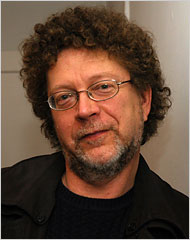Great Throughts Treasury
This site is dedicated to the memory of Dr. Alan William Smolowe who gave birth to the creation of this database.

Sven Birkerts
American Essayist and Literary Critic best known for book, "The Gutenberg Elegies"
"Our various improvements not only mark a diminution of the function improved upon… but they also work to dissolve some of the fundamental authority of the human itself. We are experiencing the gradual but steady erosion… of the species itself."
"The reality of life is that your perceptions -- right or wrong -- influence everything else you do. When you get a proper perspective of your perceptions, you may be surprised how many other things fall into place."
"A novel for me is a pretext, a way of starting up and sustaining a complicated and many layered inner exchange, a to-and-fro which I long ago discovered that I need in order to locate myself in the world. Reading...keeps the inner realm open, susceptible. Involvement in a book sets things going at a depth. If I cannot sink into some virtual 'other' place or triangulate my experience with that of another, I feel that my life is lacking the shadows and overtones and illusion of added dimension that imagination provides. It feels flat to me."
"Easy as it is to name some of the key figures, it is somewhat more difficult to set out exactly what ecocriticism believes or espouses. I don't mean this in any slighting way. Indeed, new disciplines, like new marriages, should be granted honeymoon privileges. They should be allowed to work out their credos away from the glare of publicity. Now that ecocriticism has been exposed, however, it must stand up for scrutiny."
"Everything in contemporary society discourages interiority. More and more of our exchanges take place via circuits, and in their very nature those interactions are such as to keep us hovering in the virtual now, a place away from ourselves."
"It is in adolescence that most of us grasp that life--our own life--is a problem to be solved, that a set of personal unknowns must now be factored together with the frightening variables of experience. The future suddenly appears--it is the space upon which the answers will be inscribed."
"I often find that a novel, even a well-written and compelling novel, can become a blur to me soon after I've finished reading it. I recollect perfectly the feeling of reading it, the mood I occupied, but I am less sure about the narrative details. It is almost as if the book were, as Wittgenstein said of his propositions, a ladder to be climbed and then discarded after it has served its purpose."
"It seems to me that the reading public—or the public at large—decides many things, including, increasingly, the steadily growing consumption of mass sensationalistic entertainment, and that while this is obviously a vital commercial consideration, this shouldn’t be the yardstick by which cultural value is decided. I don’t want to suggest that there should be a commissariat of artistic arbiters, but neither should “value” be seen as a function of popularity. War and Peace has achieved—and for over a century represented—a certain standard of greatness. The terms of greatness change constantly, of course, and they need to be contested intelligently, searchingly. If it is the arduousness of sustained reading that is the obstacle, and not necessarily the book in question, then we need to know that. And we need to debate seriously what is being lost when those meanings—the “stuff” inside those big books—are no longer in circulation."
"The literary world is losing some of its hold on the culture, that its debates seem increasingly marginal, divorced from the preoccupations of the mainstream. But, again, “the idea of reading War and Peace”—which is, in fact, the idea of seriousness, of the value of the deeply psychologized “big picture,” of artistic ambitiousness—ought not be mocked quite so glibly. It is not just the work, it is the inheritance of the work, the vision of history, the understanding of the intersection of the singular with the societal, that is at issue."
"Reading, because we control it, is adaptable to our needs and rhythms. We are free to indulge our subjective associative impulse; the term I coin for this is deep reading: the slow and meditative possession of a book. We don't just read the words, we dream our lives in their vicinity. The printed page becomes a kind of wrought-iron fence we crawl through, returning, once we have wandered, to the very place we started."
"I read novels to indulge in a concentrated and directed inner activity that parallels -- and thereby tunes up, accentuates -- my own inner life."
"To read, when one does so of one's own free will, is to make a volitional statement, to cast a vote; it is to posit an elsewhere and to set off toward it."
"What reading does, ultimately, is keep alive the dangerous and exhilarating idea that a life is not a sequence of lived moments, but a destiny...the time of reading, the time defined by the author's language resonating in the self, is not the world's time, but the soul's. The energies that otherwise tend to stream outward through a thousand channels of distraction are marshaled by the cadences of the prose; they are brought into focus by the fact that it is an ulterior, and entirely new, world that the reader has entered. The free-floating self--the self we diffusely commune with while driving or walking or puttering in the kitchen--is enlisted in the work of bringing the narrative to life. In the process, we are able to shake off the habitual burden of insufficient meaning and flex our deeper natures."
"If anything has changed about my reading over the years, it is that I value the state a book puts me in more that I value the specific contents."